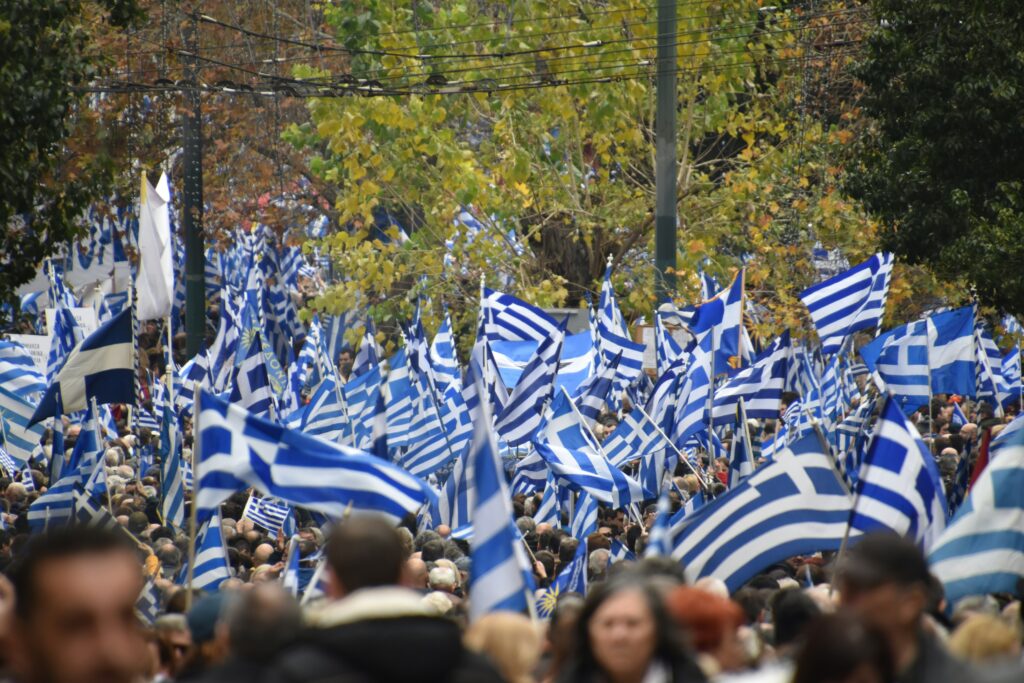Ευαγγελισμός (Evangelismos) is the word we use in Greek for the Annunciation of Virgin Mary (observed religiously on March 25th), meaning literally “the announcement of good news”. March 25th is also commemorated as the commencement of the Revolution against the Ottoman Empire which culminated in the establishment of an independent state, even though the Revolution had, in fact, started two days before, on the 23rd. The rebels consciously decided to officially declare the commencement of the revolution on the 25th, the day of the Evangelismos, not only to have Virgin Mary’s blessing (an important unifying factor for Greek Orthodox Christians), but also – and more symbolically – because … could there be better news than the fight for freedom and independence?
Disclaimer: this article is not a history lesson. I am not intending, in my limited word count, to navigate the reader through all the crucial battles, or their protagonists – the “heroes of ‘21” as we call them. I will not give you a history lesson because this is not what you need right now. In the current state of events, if anything, the world needs a toast to peace, freedom, and love; and this is the purpose that this text will attempt to serve. This article is going to be the tale of an oppressed people who broke their chains after centuries of obscurantism. Essentially, this timeless tale of persistence, optimism, and the patient but constant battle for a better future, is not only about Greece, but for any struggling people.
Growing up in Greece, we are taught from a very young age about the milestones of the Revolution and the accomplishments of the Heroes of ’21 that paved the way to independence. What is usually skimmed through in classrooms is why the revolution was instigated so late, after four centuries under the Ottoman Rule. If we reflect on the socio-political conditions of that time, we can easily conclude to the plight in which Greece had been. Greeks were going through their own Middle Ages, while the rest of Europe was living the peak of the Renaissance. While Europeans were progressing, leaving behind the obscure shadow of the Middle Ages, Greeks were uneducated (in a grand scale illiterate) and seemingly powerless against the Sultan. Nevertheless, the people were armed with the power of will, the virtue that obliges you to win when reason is telling you that you lost.
Soon, the revolution (which, unlike most revolutions in Europe during the same century, had a national rather than a sociopolitical character) would get its intellectual framing; albeit late, the ideals of the Enlightenment would reach Greek soil, mainly because of the contribution of the Philhellenes, foreign nationals who adored Greece and its civilization. Victor Hugo, one of the most consistent supporters of the newly formed Greek state, was moved by the abnegation of the Greek fighters of the revolution, which he described in poems of his – such as “Navarino” and “Les têtes du serail”- and which inspired him to conclude that “Dying is not scary; not living is”.
The young romantic poet Lord Byron would firmly stand by the locals during the Siege of Messolonghi, staying there while the Ottomans blockaded the city from the sea with their navy and their infantry and artillery bombarded the walls; he would never leave and would die there from high fever at the age of 37. One of his last documented statements was: “I gave Greece my time, my fortune, my health, and now I’m giving Greece my life!”. Such voices of solidarity and support are timeless, relevant in the 21st century and pave the way to new battles. The abnegation and devotion to a country coming from people who are not even its nationals is admirable, and it reminds us to never underestimate our homeland’s potential. Patriotism, after all, is when love for your people comes first; it is in nationalism, however, when hate for others comes first, and this line should not be crossed in our aspirations.
When I was younger and learning about the Philhellenes, my main takeaway was that even if foreigners loved Greece to the extent that they sacrificed themselves for the country, it is our duty to defend our homeland at any time, any instance, especially now, after a dire financial crisis which shook the political system from its foundations, revealing a polarized society that has long been addicted to populism and nepotism.
If I intended to convey a cohesive message through this piece on the occasion of the Greek Independence Day that would probably be that – and current affairs make us realize it the hard way – our homelands are not for granted. They are a choice we have to make every day. And to honor this choice, as the Greek poet Tasos Leivaditis captivatingly puts it:
If you want to be called human.
You have to be willing to die any morning.
From the night in isolation you will write
a big touching letter to your mother
you will write to the wall the date, your initials
and one word: Peace
as if you were writing the whole story of your life.
To be able to die any morning.
To be able to stand in front of six rifles
as if you were standing in front of the whole future
to be able, up in the fusillade that is killing you,
to hear millions of common people
that are fighting for peace while singing…
If you want to be called human.

